
what you'll learn...
overview
The multiplication in first principles was explained as repetition of multiplicand, the multiplier number of times.
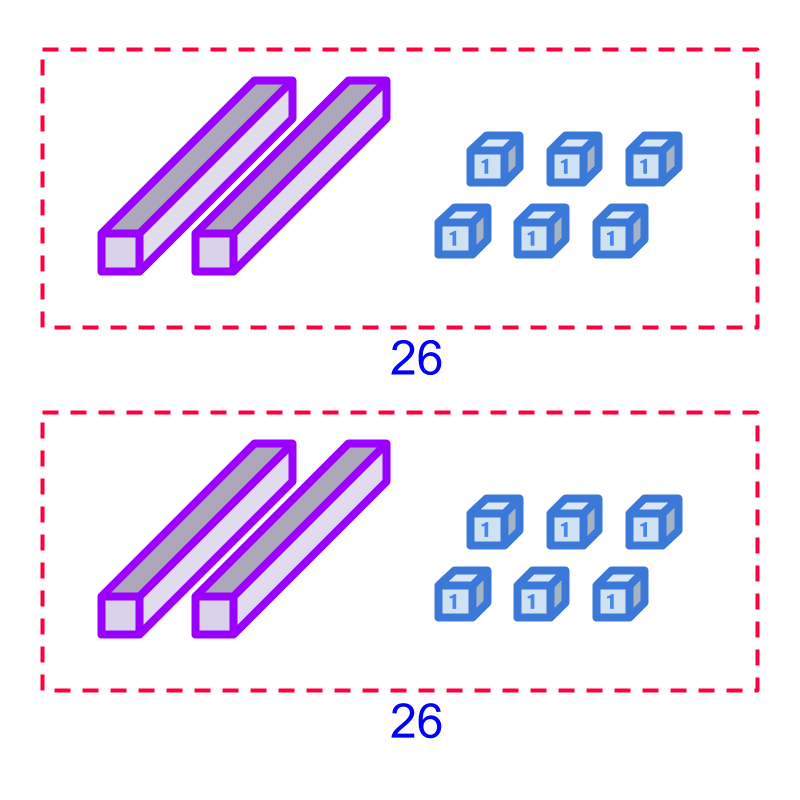 This method is revised for 2-digit numbers and established that the regrouping of units, tens, etc. is required.
This method is revised for 2-digit numbers and established that the regrouping of units, tens, etc. is required.
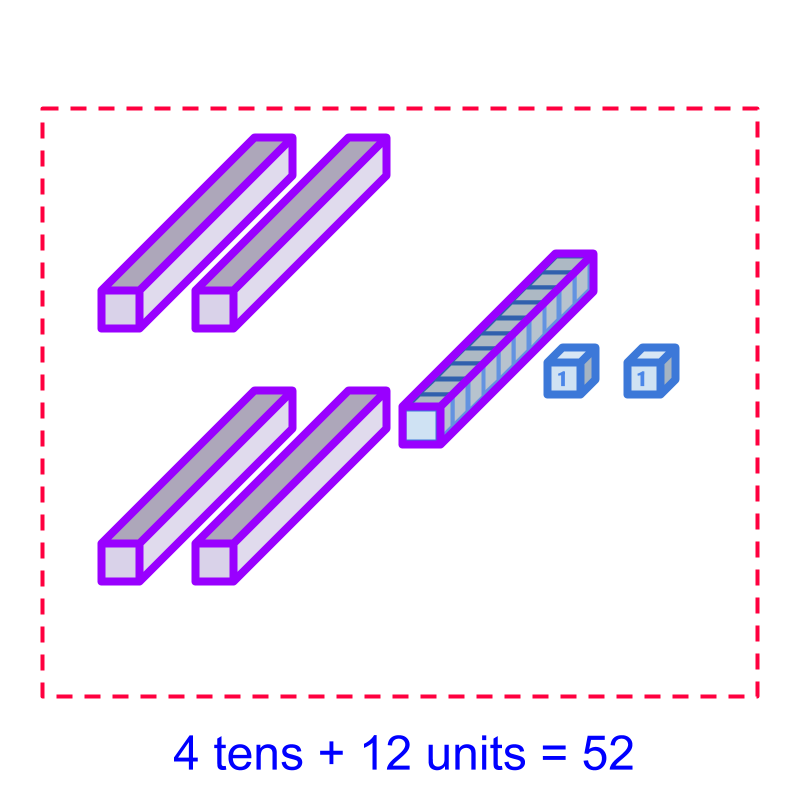 This establishes the simplified procedure : multiplication by place-value with regrouping.
This establishes the simplified procedure : multiplication by place-value with regrouping.
regrouping
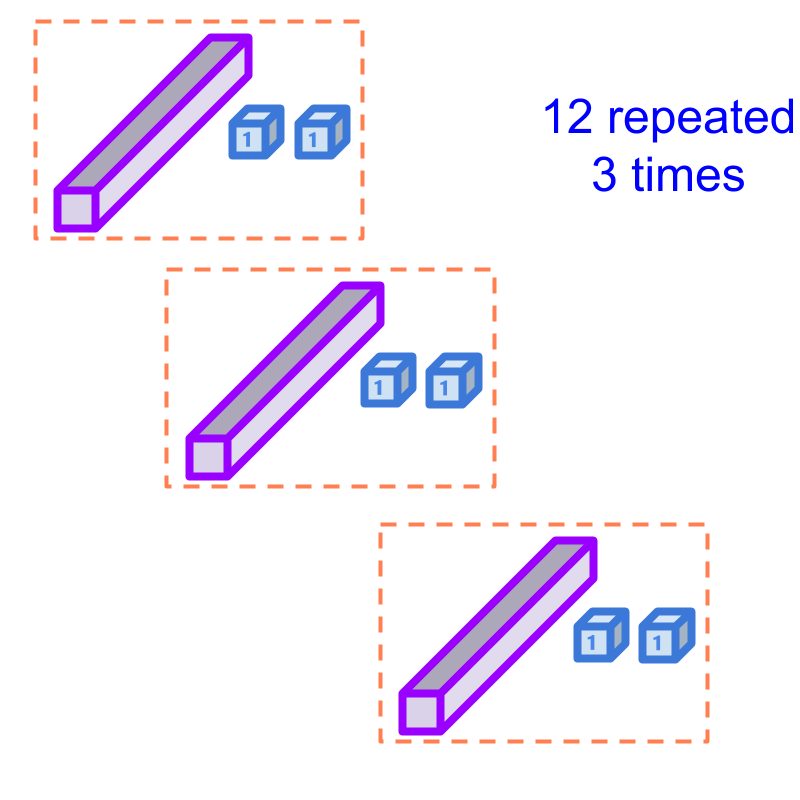
Consider multiplication of 1212 and 33.
This is performed as, combine 1212 repeatedly 33 times and count the combined quantity.
Considering the multiplication 12×312×3.
Combining 1212 repeatedly 33 times is shown in the figure. There are 3 tens and 6 units which together form value 36.
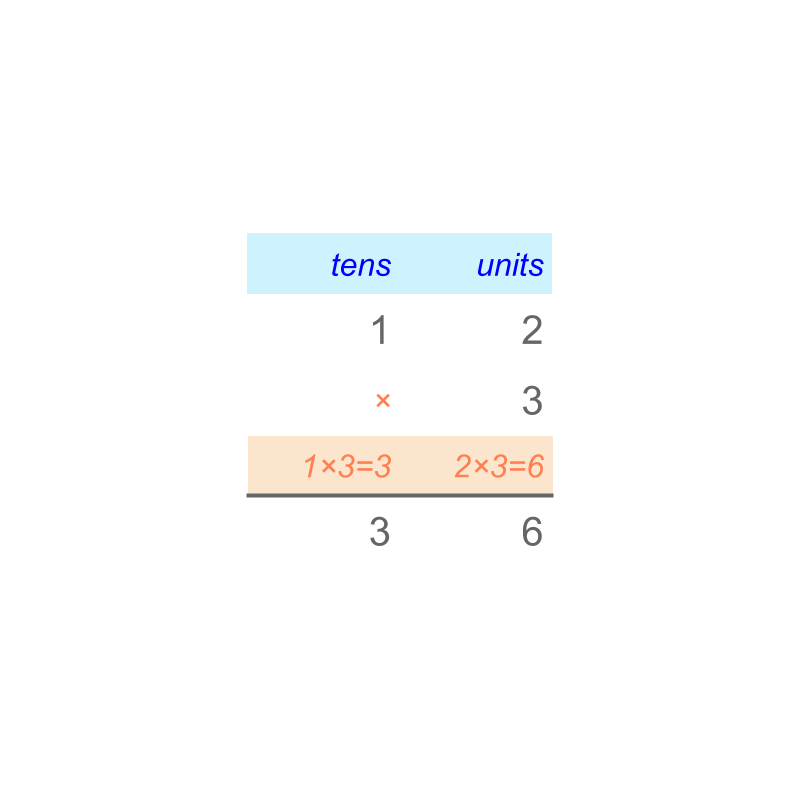
Considering the multiplication 12×3. The number 12 is given in the place value format in the figure.
The repeated addition is visualized and the multiplication is performed as illustrated in the figure.
The units place is multiplied as 2×3=6 and the tens place is multiplied as 1×3=3. The result of the multiplication is 36.

Consider the multiplication 26×2. That is, 26 is repeated twice as shown in the figure. Counting the two quantities together, there are 4 tens and 12 units. The combined value is 52.

Considering the multiplication 26×2. That is, 26 is repeated twice and combined as shown in the figure.
Note that 10 units are regrouped together to form the 1 ten. So the result of the multiplication is 52.
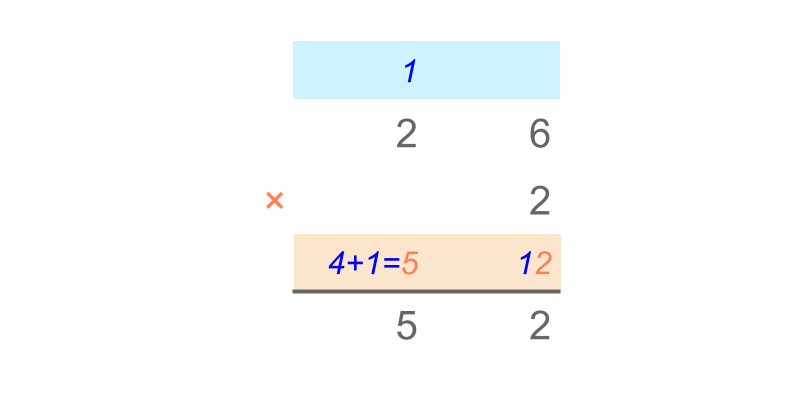
Considering the multiplication of 26×2. The number 26 is given in the place value format in the figure.
A simplified procedure Multiplication by Place-value with regrouping is given in the figure.
In the units place, 6 and 2 are multiplied to 12. The 10 unit is converted to 1 ten and moved to the tens position. This regrouping 10 of lower place-value to 1 of the immediate higher place-value is carry over. The remaining units 2 is retained.
In the tens place, 2 and 2 are multiplied to 4 and the carry over is added to that. So, the tens place of result is 4+1=5.
The result is 52.
simplify
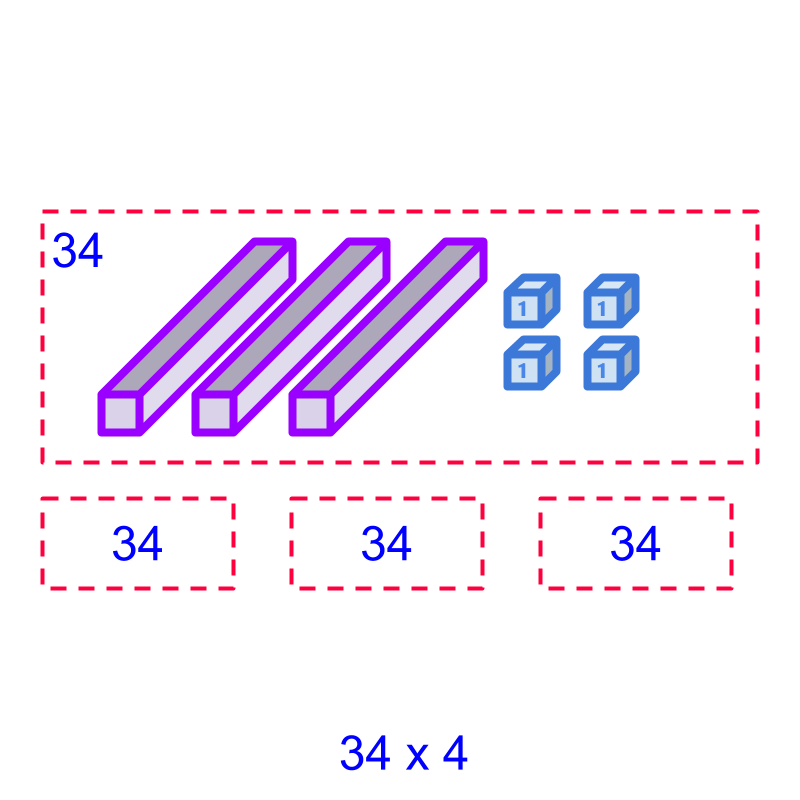
Consider the multiplication: 34×4. One 34 is shown in the figure.
To multiply, the quantity 34 can be repeated 4 times or the simplified procedure "multiplication by place-value with regrouping" can be used.
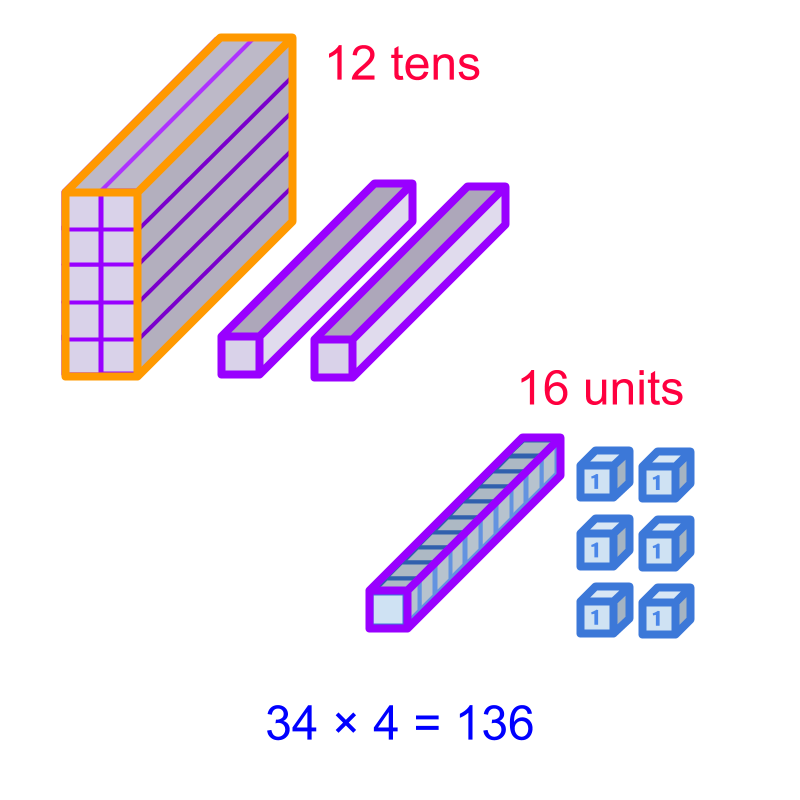
Considering the multiplication: 34×4. The value 34 is repeated 4 times and combined as shown in the figure. The combined quantity makes 12 tens and 16 units.
The 10 tens are regrouped into 1 hundred. The 10 units are regrouped into 1 ten. Then the number of hundreds, tens, and units are counted to the result 136.
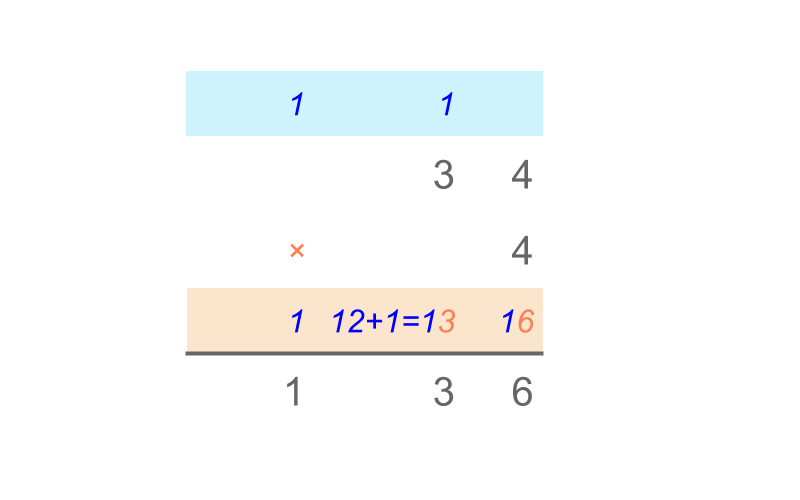
Considering the multiplication: 34×4. The numbers are given in the place value in the figure.
A simplified procedure, Multiplication by Place-value is given in the figure.
The digit in the units place is multiplied by the multiplier. The tens formed is carried over to the tens position,
Then the digit in the tens place is multiplied by the multiplier. The hundreds formed is carried over to the hundreds position.
The result of the multiplication is 136.
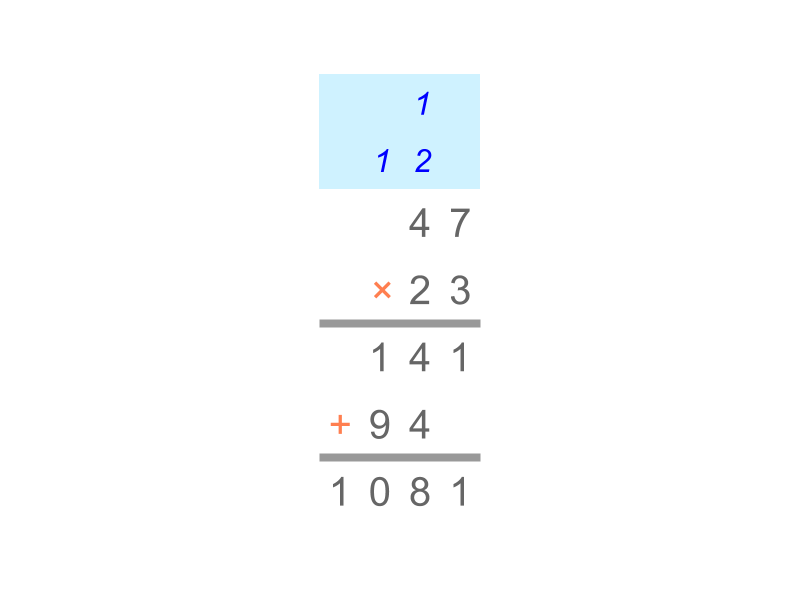
Consider the multiplication of 47 and 23. The numbers are shown in the place value format in the figure.
The multiplication in place value is illustrated. The product is 1081.
Multiplication by Place-value with Regrouping - Simplified Procedure : Two numbers are multiplied as illustrated in the figure.
Note: The procedure combines 10 units into 1 ten as carry over and so on for higher place-values.
examples
What is 284×20?
The answer is "5680"
What is 11×123?
The answer is "1353"
summary
Multiplication by Place-value - Simplified Procedure : Two numbers are multiplied as illustrated in the figure.
 Note: The procedure combines 10 units into 1 ten as carry over and so on for higher place-values.
Note: The procedure combines 10 units into 1 ten as carry over and so on for higher place-values.
Outline
The outline of material to learn whole numbers is as follows
Note: click here for detailed outline of Whole numbers
• Introduction
→ Numbers
→ Large Numbers
→ Expanded form
→ Face and place values
→ Approximation and Estimation
• Comparison
→ Comparing two numbers
→ Number line
→ Predecessor & Successor
→ Largest & Smallest
→ Ascending & Descending
• Addition Subtraction
→ Addtion: First Principles
→ Addition: Simplified Procedure
→ Subtraction: First Principles
→ Subtraction: Simplified Procedure
• Multiplication Division
→ Multiplication: First Principles
→ Multiplication: Simplified Procedure
→ Division: First Principles
→ Division: Simplified Procedure
• Numerical Expression
→ Introducing Numerical Expressions
→ Precedence
→ Sequence
→ Brackets